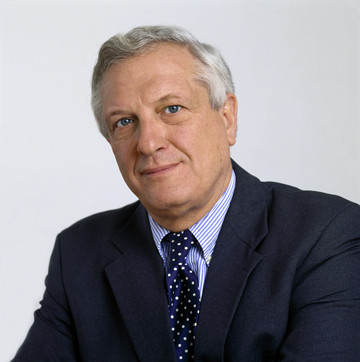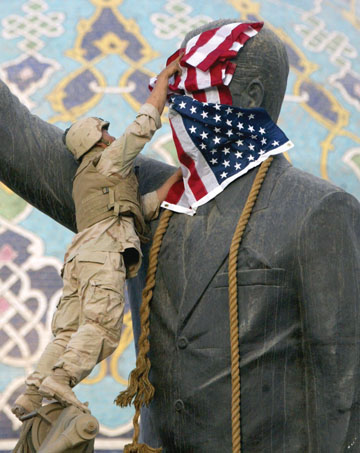America’s Guarantee: Peace or Promises
German political commentator Josef Joffe ’65 says the United States must resist self-inflicted blows—such as the invasion of Iraq—that will blunder away its supremacy.

ON THE NINTH ANNIVERSARY OF THE SEPT 11 TRERRORIST ATTACKS, the ninth anniversary of the Sept. 11 terrorist attacks, I met Josef Joffe ’65 for lunch at the Grand Elysée, a five-star hotel in the center of Hamburg. Joffe is the editor-publisher of Die Zeit, Germany’s most widely read weekly newspaper, but he’s also a presence in American letters, penning columns and articles on foreign policy for The New Republic, Foreign Policy, and The American Interest. In a few days, he’d be off to teach in Stanford’s political science department, where he is also a senior fellow at the Freeman-Spogli Institute for International Studies and Abramowitz Fellow at the Hoover Institution.
Hoover might suggest a political affiliation, at least in foreign policy matters, with the conservatives. But Joffe has also written for the left-leaning New York Review of Books and, in his latest book Überpower: The Imperial Temptation of America (W.W. Norton and Co., Inc, 2006), he faults President George W. Bush’s decision to invade Iraq as “the wrong war in pure realpolitik terms,” which backfired by emboldening the most destructive force in the region: Iran.
Even more seismic shifts in the Middle East were ahead. A revolutionary wave swept across the Arab World, toppling authoritarian regimes in Tunisia, Egypt, and Libya. As of this writing, the Assad family in Syria is struggling to hold on to power. Osama bin Laden, the charismatic face of al-Qaeda, was finally hunted down and killed in Pakistan.
But historic as such events were, they barely affected the international balance of power, which, ever since the collapse of the Soviet Union, has been a one-man show. So far, Joffe says, the United States has managed to hold onto this historically unique role, even as it remains bogged down in Iraq and Afghanistan. “Can you think of any other country that could fight two wars simultaneously and not even raise taxes?” Joffe asks.
This new world order, with the United States as a “usually placid elephant,” is the subject of Überpower. Though the title suggests a critique of U.S. foreign policy, the text inside provides only a mild one. Much of the book is spent defending the United States from the long tradition of anti-Americanism that, Joffe demonstrates, began long before George W. Bush assumed the presidency.
Joffe, now 67, grew up in Cold War West Berlin, the child of Eastern European Jews who survived World World II. “I grew up in the most adventure-filled playground in the world—bombed out Berlin,” he recalls. “But we also lived in a place where every year, things got better. My daughters, who wouldn’t go where Daddy went, graduating from Stanford and Oxford, can’t count on that anymore.”
In high school he had a rebellious streak. “Every semester or so, they threatened to kick me out,” Joffe says. He applied to be an exchange student through a group called Youth for Understanding and landed in Grand Rapids, Mich., in 1961—the year the Berlin Wall was erected. “I was dropped into a middle-class, suburban family, and I still consider them my ‘American parents.’ It was a wondrous experience for a kid from postwar Berlin. Eating meat every day. Taking a shower every day. Washing machines. My first lobster.”
But Joffe wasn’t always happy in suburban Michigan with its very strict moral and sexual codes. “It was Calvinist,” he says. “There was very little unsupervised time like you found in the big cities.” Nonetheless, he found a girlfriend, Janice from Detroit, who “was by Western Michigan standards totally cool,” Joffe remembers. “She wore black turtle necks, had a Joan Baez hairdo, played guitar, wrote poetry, and smoked Benson & Hedges cigarettes.” Janice was applying to Swarthmore, and Joffe, who was excited about what he read about the College (“bad football, leftish politics, high-powered academics”) followed suit. But only Joffe was accepted, with a scholarship. “I only had 1220 on the SAT, but perhaps the German quota wasn’t exactly oversubscribed.”
Joffe calls his early days at the College a “traumatic encounter with excellence.” At first, he struggled academically and socially. “They put me in Wharton, which was the jock dorm,” he says. “The first year was tough.” For his first philosophy paper—comparing Descartes and Leibniz—he received a C- from the professor, Richard Brandt. Joffe asked what he had done poorly to deserve such a grade. “Nothing,” Brandt said. “The others were just better.”
But then his grades improved. Joffe entered the Honors Program, majoring in political science with a healthy dose of economics and philosophy. “It was natural, coming from Berlin, that I’d be drawn to international politics,” he says.
Socially, he was “swept up” in the leftist politics that dominated the campus, joining the Swarthmore Political Action Group. “I can’t quite figure out if we were Stalinists or Trotskyites—probably Trotskyites.” He was also a member of Students for a Democratic Society, and he agitated for civil rights in Chester. “One day, we occupied City Hall,” he recalls. “We all got arrested. Today, if that happened, they’d deport me on the spot. Back then, it wasn’t like that. They just asked for my name and address, not for my passport.”
The American student movement was different from the European one, Joffe recalls: “The most brutal and most radicalized student bodies arose in the post-Fascist countries. There was a totalitarian feel to it. In the States, it was politics, sex, grass, and music—civil rights and Vietnam. Here, in Europe, it was revolution. It was a humorless movement and ultimately turned violent in both Germany and Italy.”
“Cathy Wilkerson [of the Weather Underground] was in my class,” Joffe continues. “But [it turned out] she didn’t really know how to build a bomb or rob a bank. Unlike European radicals, they didn’t go to these Palestinian Liberation Organization training camps.”
The classroom was a more conservative setting. “It was a good balance,” Joffe says. “Yes, you could go protest and go to jail, but inside the classroom, it was ‘Now, let’s take your Marxism and apply bourgeois standards of evidence and logic.’ We were forced to think really hard and appreciate scientific rigor.
“Today, in the humanities at least, there is so much identity politics, too many good intentions and not enough ‘how do we know?’ We, too, wanted a better world, but we had teachers who kept us intellectually honest.“
After graduating, Joffe earned two advanced degrees—from the College of Europe in Belgium and from Johns Hopkins—and worked for a couple years at a think tank outside Munich. Then, he went to Harvard for a Ph.D., writing a dissertation on the domestic sources of foreign policy, with a focus on West Germany. From here, a career in the academy would have been a logical step, but Joffe thought otherwise: “I wasn’t too happy with the idea of seven years as an assistant professor and the lottery of tenure.”
Fortuitously, he bumped into the editor of Die Zeit, who offered Joffe a top writing position at the German weekly in 1976 (30 years after its founding). “That’s how I got into journalism, at the top floor,” Joffe says. “It suited my temperament better. Who reads you when you’re slaving away as an assistant professor? In journalism, the gratification is almost instant.”
Though his focus was on Germany’s (mitigated) place in the world—“Germany, rich and big, is more like Sweden now,” he tells me over lunch—it was only natural that in his writings he would move on to the United States.
In an influential 1984 article for Foreign Policy, Joffe coined the term “Europe’s pacifier” to describe the United States’ presence in Western Europe. By then, it was apparent that the Soviet Union’s expansionist ambitions (both physical and political-cultural) were failing, and many in Europe and the United States—including an unlikely alliance of the European Left and American neoconservatives—wanted the United States to disengage from the continent. Joffe disagreed:
America’s role in the containment of the Soviet Union is familiar enough. What is widely neglected, however, is the protector’s role as pacifier—as the key agent in the construction of an interstate order in Western Europe that muted, if not removed, ancient conflicts and shaped the conditions for cooperation.
The most important condition was the extension of an essentially unilateral American security guarantee to Western Europe. That guarantee is normally seen only as a cornerstone of the global Soviet-American balance, with the United States providing a counterweight to Soviet power that the West Europeans were unable to provide for themselves. Yet by extending its guarantee, the United States removed the prime structural cause of conflict among states—the search for an autonomous defense policy.
With the collapse of the Soviet Union, the United States’ dominion now spanned the entire globe, and, like its role in Western Europe, Joffe largely sees this new, larger hegemony as salutary. In Überpower, he approvingly cites President Bill Clinton’s 1996 proclamation, “Because we remain the world’s indispensible nation, we must act and we must lead,” a position that’s been reaffirmed by his successors George W. Bush and Barack Obama.

Of course, the rest of the world often takes exception to American hegemony. But in Überpower Joffe demonstrates that the roots of anti-Americanism came long before the country had assumed great-power status. Often the critique is cultural, portraying the United States as having little to offer the rest of the world. The French diplomat Talleyrand described the country as having “32 religions and only one dish to eat.” (The late historian Tony Judt added, “Talleyrand’s statement anticipates ‘two centuries of European commentary.’”) Or as Hitler put it, “A single Beethoven symphony contains more culture than all that America has ever created.” The postwar rise of American “soft power” has only amplified this criticism. “Look outside,” Joffe tells me in Hamburg. “Everyone dresses American, talks American, watches American.”
Often the criticism of the United States is motivated by more pernicious beliefs. In 1915, the German writer Werner Sombart dismissed the United States as a “Jewish land.” Today, the Arab world is the main font of anti-Semitic conspiracies involving the United States, including the canard that Jews working in the World Trade Center called in sick on 9/11.
Formal resistance against the United States comes in myriad forms, Joffe writes. There are cautionary declarations from reputed allies: “Though America is the sole superpower in this world, the administration does know that it needs friends and allies,” warned German Chancellor Gerhard Schröder in the run-up to the Bush-led invasion of Iraq. Institutional forces also align to take on the United States, which often finds itself isolated on issues such as the elimination of land mines and environmental accords. There is also balancing by terror. “The most economic and efficient attack came from totally unexpected quarters,” Joffe writes, in reference to al-Qaeda.
But even terrorist attacks are unlikely to dislodge the United States from its perch. Meanwhile, China’s rise may be the biggest threat to American hegemony, but it’s a challenge that remains decades ahead. Still, the United States could dislodge itself by alienating the rest of world, many of whose actors, for all their complaints, prefer a strong (if benign) United States to the fractious, balance-of-power politics that came before. Joffe sees the Iraq invasion as an example of the type of self-inflicted blow that diminishes the United States’ status in the world. “The single-most critical difference between the Afghan War and Iraq II consists of one word: ‘legitimacy’,” he writes, continuing: Had Saddam committed aggression against the United States or any other country? No. Did he harbor terrorists as proxies? No, the “Baghdad connection” could never be established. Was he stockpiling, or about to produce, nuclear weapons and other paraphernalia of mass destruction? That assumption was dubious to begin with, given the destructive efficiency of the U.N. inspectors in the aftermath of the first Iraq War, and it proved utterly false once the second was over. Did he defy the U.N. sleuths during the run-up? In a passive-aggressive way, he did, but not systemically enough to be nabbed for obstructing justice.
Among conservative ranks—and Joffe counts himself a conservative—Iraq produced a split. In many ways, Joffe’s view of the conflict now resembles President Obama’s, who was against the invasion but, as commander in chief, has followed the path laid down by his predecessor. In a 2008 article for The American Interest (a magazine largely created by a split over Iraq among the conservative contributors to The National Interest), Joffe argues for staying in Iraq: “America brought war to Iraq. America should now bring peace to that tortured country.”
Three years later, Iraq is almost an afterthought, and it’s the U.S. involvement in Afghanistan that’s being questioned—especially with the killing of Osama bin Laden in a compound not in Afghanistan or the adjoining mountainous environs of Pakistan but in the Pakistani city of Abbottabad, possibly with the full knowledge of Pakistan’s leaders. And the Arab Spring has yet to play out to its conclusion.
But for all these new wrinkles, America’s fundamental role in the world should not change, Joffe argues. The challenge, then, will be for the United States to not blunder away its supremacy. “With great power comes great responsibility,” Joffe writes in the final section of Überpower. “As long as this unbound giant lives up to its responsibility—or enlightened self-interest—envy and resentment will not escalate into fear and loathing.”
Paul Wachter is the co-founder (with Phil Ryan ’96) of the discerning news aggregator againstdumb.com.
 Email This Page
Email This Page